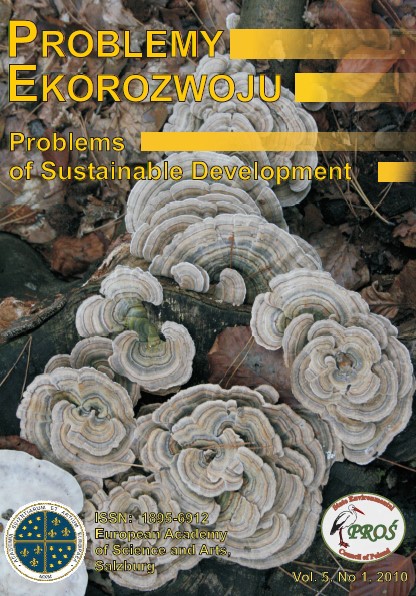Humanitarian Motives for Sustainable Developments in a Global Economy: An Essay
Article Sidebar
Issue Vol. 5 No. 1 (2010)
-
Humanitarian Motives for Sustainable Developments in a Global Economy: An Essay
Paul T. Durbin9-13
-
A Curmudgeon’s Thoughts on Sustainability
David L. Russell15-22
-
Human Progress Towards Equitable Sustainable Development: A Philosophical Exploration
Victor Udo, Artur Pawłowski23-44
-
A Multifunctional Mosaic of Green Spaces in the Context of the Lower Silesia Region (Southern Poland) Sustainable Development
Anna Zaręba45-51
-
Model of Permanent Eco-chemical Education of Employees of Chemical Industry in the Function of Ecological Development
Stanko Cvjetićanin, Mirjana Segedinac, Jasna Adamov53-58
-
Decade of Education for Sustainable Development – Polish Challenges
Tadeusz Borys59-70
-
Some of the Theoretical Sustainable Development Aspects in the Reflection of the Christian Middle Ages Philosophy
Krzysztof Bochenek71-79
-
Polish and German Experiences in Planning and Implementation of Sustainable Development
Aleksandra Kuzior81-89
-
Biodiversity Conservation as One of Necessary Conditions of Ecodevelopment
Andrzej Urbisz91-94
-
Transformation of Cultural Landscapes in the Light of the Idea of Sustainable Development
Urszula Myga-Piątek95-108
-
A Cybernetic Approach to Sacrum – Profanum Relation
Lesław Michnowski109-138
-
Problems of Evaluation of Sound and Smell Discomfort in Sustainable Development
Sebastian Bernat139-144
-
Book Review: W. Sztumski, Quo ruis homo? Środowisko życia, czas, ludzie, 2008
Ignacy S. Fiut145-148
-
Book Review: L. Gawor, Szkice o cywilizacji, 2009
Jacek Lejman145-151
-
Letter to the Editorial Office: Sustainable Economy Based on Knowledge
Bazyli Poskrobko153-154
-
Communiques on Activities of the State Environmental Council of Poland
Tomasz Winnicki157-166
Archives
-
Vol. 7 No. 2
2012-07-02 14
-
Vol. 7 No. 1
2012-01-02 12
-
Vol. 6 No. 2
2011-07-01 19
-
Vol. 6 No. 1
2011-01-03 18
-
Vol. 5 No. 2
2010-07-01 21
-
Vol. 5 No. 1
2010-01-04 16
-
Vol. 4 No. 2
2009-07-01 19
-
Vol. 4 No. 1
2009-01-05 22
-
Vol. 3 No. 2
2008-07-01 19
-
Vol. 3 No. 1
2008-01-02 12
Main Article Content
Authors
Abstract
As a philosopher, I feel the need to begin with definitions. And it is clear to me that, as with the term “sustainability,” the related term “globalization” has many meanings – almost as many as there are authors and organizations using it. For me, the term has political connotations, and thus covers the whole range of political philosophies, from the most extreme left to the most extreme right end of the political spectrum. Some people seem to assume that globalization stands primarily for an economics-based politics: the market is the most important factor, economies of scale are crucial, and the global market – without trade limitations of any kind – is what is more important than anything in today´s technologized world.
But no sooner than we have put the matter in those terms, it is clear that there is another pole. Ever since Lenin, Marxists have maintained that globalization in that sense means no more than an extension of capitalism, the exploitation of less developed parts of the world for the advantage of imperialist capitalist managers in the most developed parts of the world. That, it seems to me, is the root of the rhetoric of many outspoken leftist critics of globalization in the past decade or so.
That said, it seems to be clear in principle that there is a whole range of political interpretations of globalization that lie between these extremes.
Keywords:
References
CROCKER D., Ethics of Global Development, Cambridge University Press, New York 2008.
DURBIN P.T., 2002, Can Corcovado National Park in Costa Rica Be Saved? How to Apply the Principles of the Earth Charter, in: Just Ecological Integrity, eds. Miller P., Westra L., Lanham, MD: Rowman & Littlefield, Oxford 2002, p.
DURBIN P.T., 2008, Is There a Best Ethic of Sustainable Development?, in: Problemy Ekorozwoju/ Problems of Sustainable Development, vol 3 no 2, p. 5-14.
DURBIN P.T., 2009, Sustainable Activism, the Center for Energy and Environmental Poli- cy and Experimental Learning, in: Problemy Ekorozwoju/Problems of Sustainable Development, vol 4 no 1, p. 15-32.
NUSSBAUM M., Frontiers of Justice: Disability, Nationality, Species Membership, Harvard University Press, Cambridge MA 2006.
WCED, Our Common Future, Report of the World Commission on Environment and Development of the United Nations [the so-called Bruntland Report], Oxford University Press, Oxford 1987.
SNOW C. P., The Two Cultures and the Scientific Revolution, Cambridge University Press, Cambridge England 1959.
Article Details
Abstract views: 61
License

This work is licensed under a Creative Commons Attribution-ShareAlike 4.0 International License.


